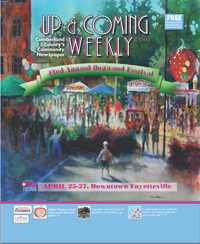 As I write this, Labor Day has come and gone. School is back in session, families are settling into normal school year routines, sportscasters are talking about Friday night football, and students in shorts and T-shirts wearing backpacks walk down my street every afternoon.
As I write this, Labor Day has come and gone. School is back in session, families are settling into normal school year routines, sportscasters are talking about Friday night football, and students in shorts and T-shirts wearing backpacks walk down my street every afternoon.
All of this brings memories of my student days in the old Fayetteville City Schools system and the Precious Jewels’ days in its successor, Cumberland County Schools, from the perspective of a parent. The three decades that separated these experiences brought significant changes in education, including subject matter, teaching techniques, classroom design and function, greater diversity among both students and educators, not to mention what we used to call “school clothes.”
But much was the same, too.
Most of my generation and those of the Precious Jewels attended the public schools to which we were assigned. Our curricula were standardized for the most part, with some electives available in middle and high school. The experience was not exactly “one size fits all,” but there was not much variety in academic offerings. Some teachers were willing to help students pursue an area of special interest, and some were not, so most students had similar academic and social experiences during our school years. Anything outside those we explored on our own.
Things are changing in American education and changing fast. All over our country, and certainly in North Carolina, families have expanding educational options. In my day, the only children not in public schools were probably not there because of an illness or disability. There were a few independent and religious schools, but no one I knew had ever heard of charter schools, magnet schools, much less home schools where parents do double duty as moms and dads as well as teachers and athletic coaches.
Most of us, including this columnist, believe that choice is a positive development, but there are downsides. A big one is that many public school systems are losing students to the various options, including charter schools, which taxpayers also fund. Also, North Carolina offers taxpayer-funded vouchers for private schools, including religious ones, which further lessen funding for public schools.
Teachers are different as well. In my day and to some extent in the Precious Jewels’ day, women had fewer career options, with teaching remaining a popular one, in part because of its traditional calendar year and state-sponsored benefits. Today, women have far more career choices and are taking them in droves. More men are also in classrooms, but, generally speaking, teaching has become a less attractive option. Enrollment in college and university teaching programs is way down, with some schools actually closing. While Americans, including we North Carolinians, pay homage and loud lip service to the professionalism of teachers and how much we appreciate them, we pay them such low salaries that many are forced to take second and thirds jobs to support themselves and their families. According to the National Center for Educational Statistics, North Carolina teacher pay adjusted for inflation has dropped 13 percent over the last 15 years, ranking 47th in the nation in the school year 2013-14. If we were honest with ourselves, we would admit that many of our best and brightest, even those who yearn to teach, are choosing other careers out of economic necessity.
All of which brings me to a nagging worry that sometimes keeps me awake at night.
As the United States follows Western Europe in becoming more diverse and more secular, the “glue” of common experience that has historically bound us as a people is fraying.
Vastly different from the millions of veterans who were drafted into service in earlier generations, volunteer military service has resulted in well-educated, well-trained and dedicated personnel, but far fewer of them. Today, only about one-half of 1 percent of Americans are on active duty, making military service a rare rather than common national experience.
Millions of us are active in our faith, but religious diversity means this is also a less than common national experience. And, while most American children still attend public schools, more options mean that, too, will become a tie less binding.
All are reminders that the decisions we make for our own families, multiplied by millions, impact all of us and our understanding of what it means to be an American.

 How to resolve AdBlock issue?
How to resolve AdBlock issue? 









